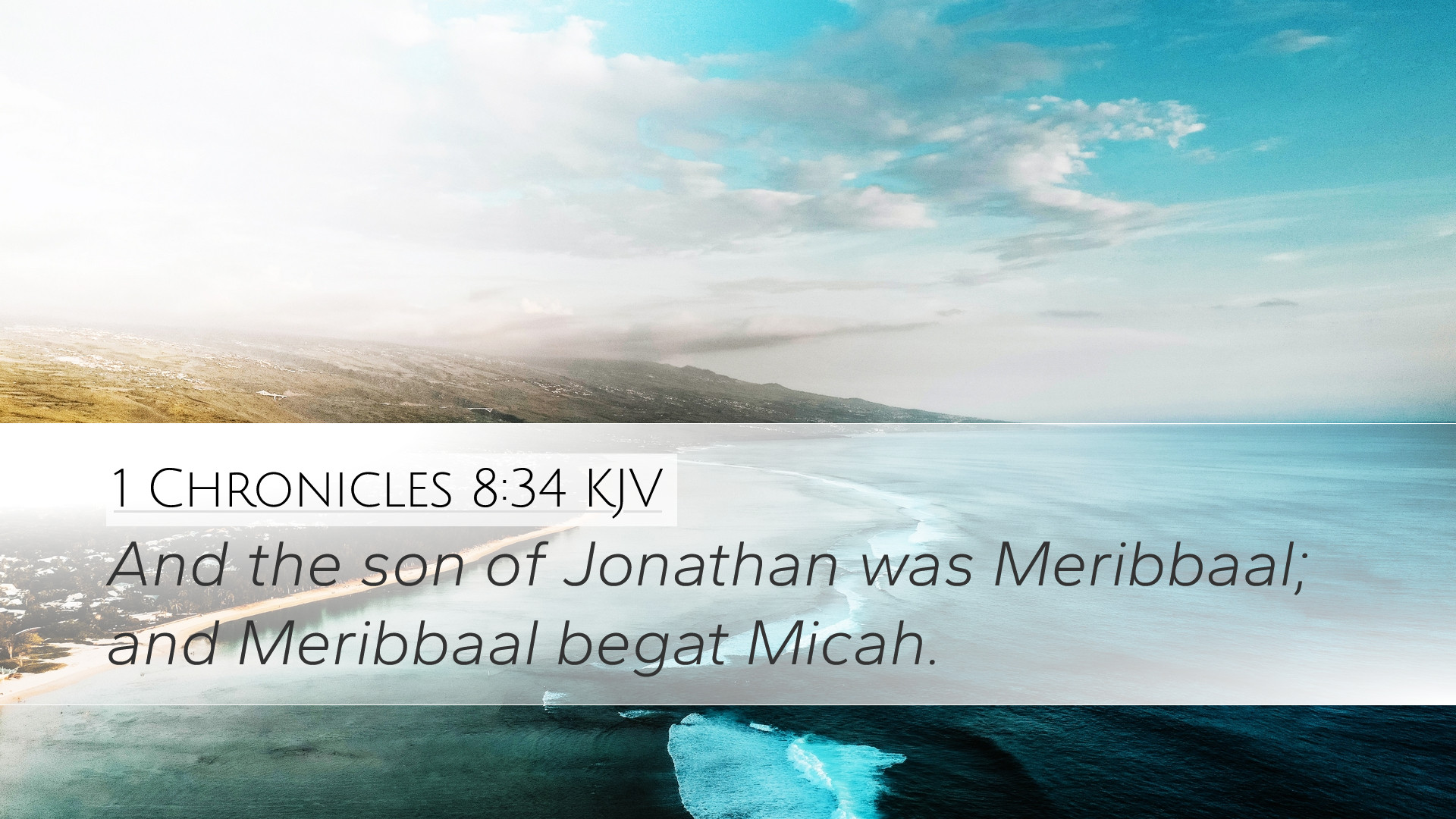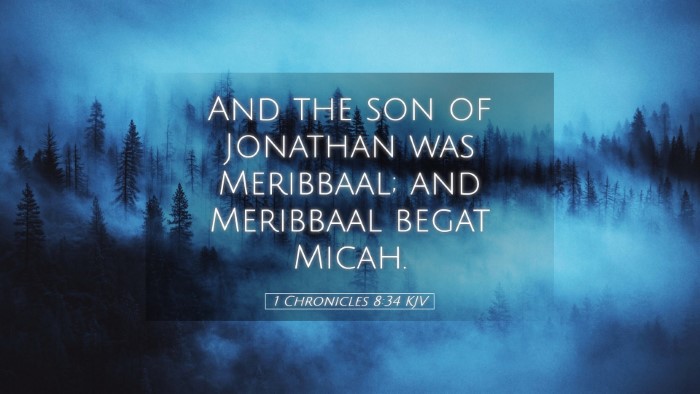Commentary on 1 Chronicles 8:34
The verse 1 Chronicles 8:34 states: "And the son of Jonathan was Merib-baal; and Merib-baal begat Micah." This passage contains significant theological and historical implications that are vital for understanding the narrative of the Old Testament, especially concerning the lineage of Saul and the implications of covenant loyalty.
Introduction
Within the genealogical records of the Old Testament, the mention of Merib-baal in this verse serves as a critical link between the reign of Saul and the subsequent developments in the house of David. The chronicler aims to demonstrate the unbroken line of descendants from Saul, highlighting God’s faithfulness to His promises even amidst the tumult of Israel's history.
Exegesis of the Text
In examining the phrase "the son of Jonathan was Merib-baal", we recognize that Jonathan, the son of Saul, was a man of remarkable loyalty and bravery. Merib-baal, his son, reflects not just Jonathan's lineage but also an enduring testament to the faithfulness of God amidst the backdrop of broken royal lines.
Merib-baal translates as "the contender against Baal" and is noteworthy because it shows a rejection of idol worship prevalent among the nations surrounding Israel. This name reflects a theological position rather than a mere designation, emphasizing the importance of divine allegiance over cultural conformity.
Furthermore, the phrase "begat Micah" suggests that Merib-baal continued the legacy of his forebears. Micah will carry forward this legacy, indicating the continuity of God’s covenant people and the establishment of a faithful remnant.
Theological Implications
-
Covenant Loyalty: This passage encapsulates the theme of covenant loyalty. Jonathan’s loyalty to David, despite the adversities posed by his father Saul, resonates here, as Merib-baal, the son of Jonathan, lives on in the historical narrative. This is significant for understanding how the covenant extends beyond immediate circumstances to future generations.
-
Grace and Redemption: The mention of Merib-baal and his lineage serves to highlight the grace that accompanies God’s redemptive plan. Despite the violent transitions of leadership between Saul's and David's reigns, those associated with Jonathan are not written off, which underscores God’s grace in preserving a remnant of Saul’s lineage.
-
Restoration of Identity: Understanding the history behind Merib-baal can serve as a reminder of how certain individuals manage to carve out an identity within a turbulent historical context. For Merib-baal, his very naming reflects a chosen identity that conflicts with the prevailing culture of Baal worship.
-
Familial Legacy: The familial nature of the names mentioned points to the overarching Biblical emphasis on lineage and identity. In biblical culture, one's lineage is not merely a matter of ancestry; it encompasses spiritual, social, and political dimensions that bind communities and maintain traditions.
Historical Context
This verse occurs in a broader genealogical context in the Chronicles, which has its emphasis on the preservation of the records of Israel’s tribal affiliations post-exile. The significance of this specific verse is tied to the identity and restoration of Israel after their Babylonian captivity, showing God’s faithfulness to maintain a line through which blessings and covenants to Israel flow.
By tracing the ancestry of Merib-baal, the author of Chronicles affirms the historical significance of these figures while simultaneously addressing the concerns of the returning exiles by emphasizing that the tribes of Judah and Benjamin, and indeed all the tribes, have a rightful place and heritage in the community of Israel.
Reflection for Modern Readers
For pastors, theologians, and laypersons today, this text invites deep reflection on the themes of loyalty, legacy, and divine purpose. It affirms the belief that God’s plans transcend human failures and societal turmoil, as evidenced by the lineage of Merib-baal through which God continues to work.
Application: Just as Jonathan’s lineage carried forward his legacy of loyalty in difficult times, so too may modern believers consider their own familial and spiritual legacies. How can they uphold the values of faithfulness, integrity, and covenant loyalty in the face of contemporary challenges?
Conclusion
In summary, 1 Chronicles 8:34 encapsulates profound themes relevant to both its original audience and readers today. It presents a connection between past covenant faithfulness and future hope. Reflecting on this genealogy encourages believers to acknowledge their own stories within God’s greater narrative of grace, bringing them into a fellowship that transcends time and circumstance.


